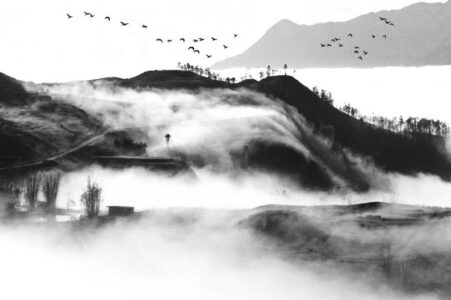Most years I try to ignore Halloween. I’m not a big fan of dressing up in costumes, going to parties, or any of the other nonsense that comes with the modern secular version of this holiday. Not to mention my relatively new status as an outcast has particularly strong overtones with this holiday for some indecipherable reason.
However, this morning I was reminded of an older meaning for this holiday. Halloween, or Hallows’ Evening, or All Saints’ Eve, or even Samhain, has roots that go back to the dim dawn of our cultural traditions. This day has been celebrated in various ways over the years, but the message has always been one of remembrance of those who have died.
Tomorrow is All Saints Day. In Catholicism, this is a holy day on which we remember the saints that are in heaven. Some say that Catholic tradition borrowed elements (including the day) of this celebration from earlier traditional observances such as Samhain. It was in this earlier Celtic observance that the party actually started the night before: hence, Hallowe’en. On its surface, Samhain was a celebration of the harvest, and a preparation for winter. But in addition to good eating and reflecting on the end of the growing season, Samhain is said to also mark a “thinning” of the boundary between the worlds of the living and the dead. Thus, this day has always been known as one to remember death and those who have died.
Maybe it is because the changing of seasons signifies a death of sorts, the end of summer. But with this death comes the eventual promise of a new beginning. It is hard to see that same cycle when it comes to our own lives and the lives of those we love, but perhaps it is there in some form. Indeed, many faith traditions believe, in one way or another, that death is not merely an end, but it is the beginning of something else. Something beyond. And, hopefully, something better.
Who do we remember?
I recently saw the passing of my grandmother, but she was not the first person to come to mind when I started thinking this morning about people I have lost to death. The first person I remembered was Aaron Swartz.
Aaron’s death struck me with surprising force, given that we never met face to face and I hadn’t thought about him for years. But he was always someone I admired and looked up to. I probably never put the thought together in precisely this way, but on those days I felt ineffective, I might have made myself feel better knowing that people like Aaron were still out there doing good work. The force of his death was a punch to the chest that made it clear that was no longer the case. The world had one fewer worker doing that good work; if we wanted it to get done, we were going to have to do it ourselves.
Aaron’s death, like so many, should never have happened. He was too young. He was too good. Too influential. Too loved. Too … I could go on. But the fact is that death is inevitable, for all of us. We mourn it, we complain about its timing or its means, but at the end of the day we have no right. Death comes. That’s all there is to it. From the moment we are born, every one of us is in the process of dying. If, someday, we find ourselves to be alive, it’s only because we haven’t finished dying yet. Death is an essential part of life. One cannot exist without the other.
But I digress. Death is part of life’s experience. For me, Aaron’s death became a motivation to be more intentional and more zealous about the social problems that he had been fighting against his whole life. Ultimately, I made a promise to myself (and to him) that I would never forget him and the work that was important to him. Now, on my way to do academic social research, I continue to find myself motivated by the momentum Aaron created, and bolstered by the principles upon which he built his theories of the world.
Those who have gone before us
Truth be told, Aaron was (and continues to be) one of my heroes.
Another one of my heroes is Anthony Bourdain. When one of my heroes died, it felt like a tragedy. When a second died, it felt like maybe there was something wrong with me. But that’s a topic for another post.
One of the good things about death is that it freezes a person in time. Aaron will always be 26. He will never outgrow his impatient progressiveness. He will never retire. As such, he becomes (at least to me) something like a saint. Someone I can always look up to, someone who will never disappoint me.
I can see the same thing with my grandmother. In life she had become a frail person, barely able to manage the demands of passing through the day. In death, she has become an iconic version of herself: an amalgamation of her century of living that condenses all her best characteristics and moments into a single totem of her value. When a person is alive, it is easy to forget that they have lived. In death, the value of the past becomes ever present.
Who do you remember?
Who has, in death, touched your memory in a significant way? Who has passed away from this life, but not from your heart? Whose picture would you put on your altar when you reflect on the things most important to you?

Leave a Reply